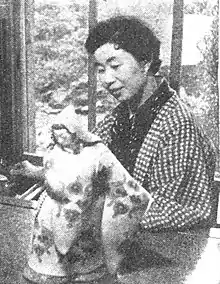Tsuneko Nakazato
Tsuneko Nakazato (中里 恒子, Nakazato Tsuneko, 23 December 1909 – 5 April 1987) was the pen-name of a novelist in Shōwa period Japan. Her real name was Nakazato Tsune.
Tsuneko Nakazato | |
|---|---|
 | |
| Born | 23 December 1909 Fujisawa, Kanagawa, Japan |
| Died | 5 April 1987 (aged 77) Zushi, Kanagawa, Japan |
| Occupation | Writer |
| Genre | novels |
Early life
Nakazato was born in Fujisawa city, Kanagawa prefecture and graduated from the Kanagawa Girls’ Higher School. When she was 17 years old she met Tatsuo Nagai and started writing, publishing multiple novellas before her marriage at age 19.[1]
Literary career
In 1938, Nakazato became the first woman to win the prestigious Akutagawa Prize, with her short story Noriai bashi.[2][1] After World War II, she came to be known for a number of works addressing the issue of international marriage, including Mariannu monogatari ("Maryann's Story", 1946) and Kusari ("Chain", 1959), which were drawn from her own daughter's marriage to an American.[1]
Her novel Utamakura ("Song Pillow", 1973) was awarded the Yomiuri Prize.[3] In 1974, she received the Japan Art Academy Prize,[4] and became a member of that institution in 1983.
Nakazato was a resident of Zushi, Kanagawa from 1932 until her death due to colon cancer in 1987. Her grave is at the temple of Engaku-ji in Kamakura.
References
- Shibata Schierbeck, Sachiko; Edelstein, Marlene R. (1994). Japanese Women Novelists in the 20th Century: 104 Biographies, 1900-1993. Museum Tusculanum Press. ISBN 9788772892689.
- 芥川賞受賞者一覧 (in Japanese). Bungeishunjū. Retrieved 2010-01-27.
- "読売文学賞" [Yomiuri Prize for Literature] (in Japanese). Yomiuri Shimbun. Retrieved September 21, 2018.
- "歴代授賞者一覧" [List of Prize Winners] (in Japanese). The Japan Art Academy. Retrieved September 21, 2018.